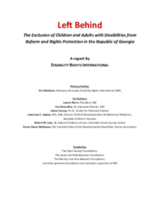This hard-hitting report by Disability Rights International (DRI) is the product of a 3-year investigation into the orphanages, adult social care homes and other institutions that house children and adults with disabilities in the Republic of Georgia. Over the past decade, the Government of Georgia has undertaken an ambitious child care reform process. As a result, the majority of its state-run institutions for children without disabilities have been closed and replaced with community services that enable vulnerable families to keep their children at home. DRI reports, however, that institutionalized children with disabilities were largely excluded from this reform process. UNICEF and USAID report that the institutional population in Georgia’s state-‐run orphanages has decreased by more than 90% since 2005— leaving less than 150 children in state-‐run institutions. This number, however, does not include children living in church- run institutions. It does not include the children who live in Georgia’s six residential boarding schools for children with disabilities. Nor does it account for the many children who have been permanently transferred to adult institutions over the course of a decade. According to DRI, as the government was closing state-run orphanages, children were being transferred to these other forms of segregated environments.
The report notes that local organizations, with the assistance of UNICEF and international donors, have made important steps forward in promoting foster care, small group homes and day care centers to promote deinstitutionalization of children in Georgia. Some children with mild disabilities are benefiting from recently created foster care services for children with disabilities, however, DRI reports that neither foster care services nor small group homes were considered “designed” or “equipped” for children with more severe disabilities. As a result, DRI points out that for Georgia’s children with disabilities in orphanages who are prevented from taking advantage of any of the existing community services, lifelong institutionalization remains the only option. According to DRI, the exclusion of many children and adults with and without disabilities from reforms has permitted life-‐threatening abuse, neglect and segregation to continue in Georgia’s orphanages and other institutions. DRI reports that children with disabilities are subjected to physical and emotional neglect and abuse, and many children are denied life-‐saving medical treatment simply because they have a disability. It states that its investigators witnessed infants dying slow painful deaths because of the intentional withholding of medical care; children who are subjected to the neglect and lack of stimulation that leads to self-‐ abuse; and children whose disabilities were so worsened by lack of appropriate one-‐on-‐one care that they had become permanently bed-‐ridden. In one orphanage, DRI documented a 30% death rate for children with disabilities over an 18-‐month period in 2009-‐2010. Those who survive to adulthood are warehoused indefinitely.
In addition to children and adults with disabilities, the report also highlights that all children in Georgia’s church-‐run institutions are completely excluded from deinstitutionalization reforms. A parallel system of orphanages exists under the authority of the Georgian Orthodox Church. While the government is shutting down state-‐run orphanages, it continues to fund the establishment of new orphanages run by the church. Because these facilities are completely unregulated, they create particularly serious risks to human rights. The exact numbers of children in these facilities are off the public record but the report quotes estimates of between 1,200 to 1,500 children.
In 2009, the Republic of Georgia signed the UN Convention on the Rights of Persons with Disabilities (CRPD) and committed itself to the treaty’s principle of inclusion. While taking valuable steps to integrate non-‐disabled children into society, the reports states “Georgia chose to leave the most vulnerable people behind—children and adults with disabilities.” The report also questions the role of international agencies and donors in this process. It points out that while the Republic of Georgia was closing state-‐run institutions for children without disabilities, the United States government and other international organizations provided funding for the building or renovation of new institutions for persons with disabilities— perpetuating segregated care for Georgia’s most vulnerable population. DRI concludes that Georgia and international donor organizations have failed to live up to the obligations of CRPD articles 19 and 32 and it calls on the government to take immediate action to include all persons with disabilities in its deinstitutionalization reforms.
©Disability Rights International

